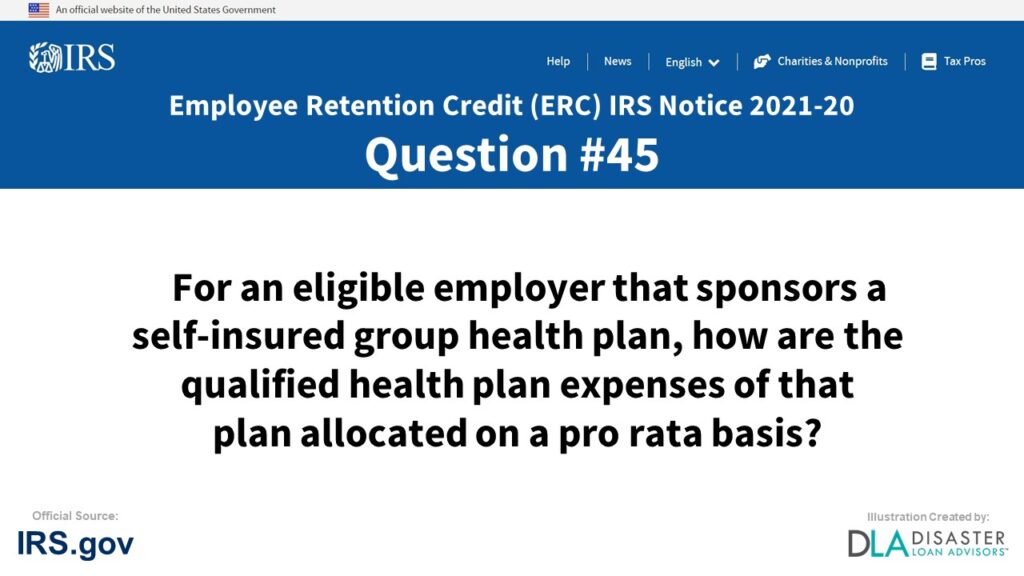
Question #45:
For an eligible employer that sponsors a self-insured group health plan, how are the qualified health plan expenses of that plan allocated on a pro rata basis?
Found under the H. Allocable Qualified Health Plan Expenses section of the Employee Retention Credit (ERC) IRS Notice 2021-20 with updated guidance to help business owners follow the current ERC rules.
The answer to question #45, For an eligible employer that sponsors a self-insured group health plan, how are the qualified health plan expenses of that plan allocated on a pro rata basis?, can be found below.
ERC IRS Notice 2021-20 Question #45:
H. Allocable Qualified Health Plan Expenses
For an eligible employer that sponsors a self-insured group health plan, how are the qualified health plan expenses of that plan allocated on a pro rata basis?
An eligible employer who sponsors a self-insured group health plan may use any reasonable method to determine and allocate the qualified health plan expenses, including (1) the COBRA applicable premium for the employee typically available from the administrator, or (2) any reasonable actuarial method to determine the estimated annual expenses of the plan.
If the eligible employer uses a reasonable actuarial method to determine the estimated annual expenses of the plan, then rules similar to the rules for insured plans are used to determine the amount of qualified health plan expenses allocated to an employee. That is, the estimated annual expense is divided by the number of employees covered by the plan, and that amount is divided by the average number of work days during the year for all covered employees (treating days of paid leave as work days and any day on which an employee performs any work as a work day). The resulting premium should then be adjusted to reflect any portion that employees contribute after-tax. The resulting amount is the amount allocated to each day of qualified wages.
For more information about the Employee Retention Credit (ERC) IRS Notice 2021-20, visit the Internal Revenue Service (IRS) Department of the Treasury, official IRS.gov tax website.
Conclusion and Summary on For an eligible employer that sponsors a self-insured group health plan, how are the qualified health plan expenses of that plan allocated on a pro rata basis? – #45 ERC IRS Notice 2021-20
The answer to Question #45: “For an eligible employer that sponsors a self-insured group health plan, how are the qualified health plan expenses of that plan allocated on a pro rata basis?” was answered in detail above. It was found under section “H. Allocable Qualified Health Plan Expenses” in IRS Notice 2021-20.
Leave a comment below if you have further questions on the Employee Retention Credit (ERC) or for clarifications on For an eligible employer that sponsors a self-insured group health plan, how are the qualified health plan expenses of that plan allocated on a pro rata basis?
Employee Retention Tax Credit (ERTC): Expert Assistance to Claim Your Business ERC Credit
Up to a $26,000 ERC Refund from the IRS for Each Employee
Disaster Loan Advisors can assist your business with the complex and confusing Employee Retention Credit (ERC), Form 941-X, and the Employee Retention Tax Credit (ERTC) program.
Depending on eligibility, business owners and companies can receive up to $26,000 per employee based on the number of W2 employees you had on the payroll in 2020 and 2021.
The ERC / ERTC Tax Credit Program is a valuable IRS tax credit you can claim. This is money you have already paid to the IRS in payroll taxes for your W2 employees.
We DO NOT charge a percentage (%) of your ERC Refund like some companies are charging. Some ERC firms out there are charging upwards of 15% to 35% of your ERC refund!
Our professional ERC fee and pricing structure is very reasonable in comparison.
If you are looking for an ERC Company that believes in providing professional ERC Services and value, in exchange for a fair, reasonable, and ethical fee for the amount of work required, Disaster Loan Advisors is a good fit for you.
Schedule Your Free Employee Retention Credit Consultation to see what amount of employee retention tax credit your company qualifies for.
Cover Image Credit: Irs.gov / IRS Notice 2021-20 / Disaster Loan Advisors.
